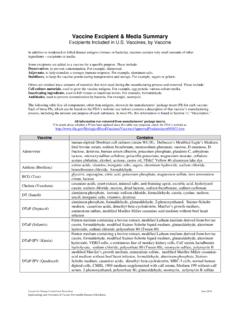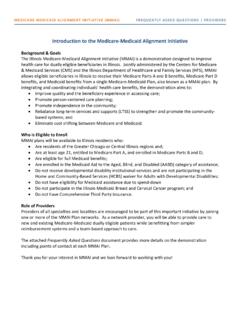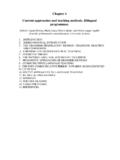Transcription of Theories of Addiction and Implications for Counselling
1 Chapter 1 Theories of Addiction and Implications for CounsellingALAN C. OGBORNEMany theorists have tried to account for why people use alcohol and other drugs, andespecially why they continue or relapse despite negative consequences. Some theoriessuggest genetic and other biological factors, while others emphasize personality factorsor social-environmental factors (Lettieri et al., 1980). While these factors have all beenshown to contribute to persistent substance use and to relapse following periods ofabstinence, no one set of factors can account for all types of substance use.
2 Rather,substance use appears to result from complex interactions of biological, psychologicaland social-environmental structures and processes (Arif & Westermeyer, 1988).This chapter outlines these factors and the ways in which they may interact. Someimplications for Counselling will also be considered. The focus is on factors thataccount for why substance use continues once it has started, and why people relapsefollowing periods of abstinence. (Some of these factors also account for why peoplebegin substance use, but that is not the subject of this chapter.)
3 FOCUS AND TERMINOLOGYThis book is about ways to help people with alcohol and other drug problems. It isnot especially about helping alcoholics or drug addicts, although many peoplewho use substances may be given these labels by those who know them and by someclinicians and researchers. This book has a broader focus: it concerns people whoseproblems with substances vary in kind and severity. 3 This chapter also has a broad focus: it summarizes Theories of substance use, includ-ing use that is often labelled addictive.
4 However, the terms addictive and Addiction , and the related term alcoholism, will generally be avoided, because they have no agreeddefinitions and have limited value in many Counselling settings. These labels are used inthis chapter only in a historical context or if they appear in a cited experts do agree that the concept of dependenceis useful. Dependence refersto a cluster of cognitive, behavioural and physiological symptoms of varying severity,consistent with the use of the term by the World Health Organization (1992) and theAmerican Psychiatric Association (2000).
5 The American Psychiatric Association s (APA) criteria for a diagnosis of substance dependence are met when any three of the following occur at the same timeduring a 12-month period: tolerance as indicated by the need to increase dosage to obtain the desired effect, orreduced effects with continued use of the same dose withdrawal symptoms characteristic of a particular substance use in larger amounts or over a longer period than the user intended persistent desire for the substance, or unsuccessful efforts to cut down a great deal of time spent in obtaining or using a substance social and other activities given up or reduced due to substance use use despite persistent or recurrent problems ( , health or social problems)
6 Although the moralistic Implications of the term substance abuse concernmany experts, the APA uses this term to refer to a condition that is met when one or more of the following symptoms occur within a 12-month period, provided thecriteria for substance dependence have not been met during the same period: recurrent substance use resulting in a failure to fulfil obligations at work, school or home recurrent substance use in physically hazardous situations recurrent substance-related legal problems continued substance use despite persistent or recurrent social or interpersonal problems caused or exacerbated by the effects of the substance.
7 We will use the phrase alcohol or other drug problem with the understandingthat such problems are social constructions. In some cases, such use may beessentially benign, but may be seen as a problem because it contravenes social norms( , occasional use of alcohol by people whose religion forbids it, or the occasionaluse of cannabis). More serious problems may also be defined differently by each ofthose involved. Weekend drunkenness may be intolerable to a spouse but just fine tothe drinker s companions.
8 An important task for counsellors is to negotiate a com-mon understanding of the problems to be addressed. Relevant issues are discussed inthe chapters in this book on assessment and motivational chapter does not deal with the so-called disease concept of alcoholism,which is less a testable theory than an analogy. Nonetheless, it has important implica-tions for the ways in which alcoholism is regarded and treated. When viewed as adisease, alcoholism becomes a legitimate condition for treatment by medical and4 Alcohol & Drug Problems: A Practical Guide for Counsellorsallied professionals, rather than simply a bad habit or a sign of moral weakness.
9 Thedisease analogy is appropriate if the term is understood to include complex condi-tions, such as high blood pressure, that are influenced by genetic and lifestyle , the analogy breaks down when alcoholism is compared with diseases withclear causes, such as tuberculosis or FACTORSG enetic InheritanceThere is growing evidence that alcohol use is influenced by genetic factors (AlcoholHealth and Research World, 1995; Shuckit, 1999). The strongest evidence comes fromstudies of family histories, twins and adopted children, different racial groups, andanimals.
10 Genetic factors seem to influence the ways in which humans respond to andmetabolize alcohol, and seem to contribute to neurological dysfunctions common inpeople whose drinking problems begin at an early age (see the discussion of psycho-logical factors, below). Genetic factors also appear to play a role in people s use oftobacco and other drugs (Madden & Heath, 2002).It is believed that many genes influence people s responses to alcohol, and thattheir responses reflect a continuum of vulnerability to alcohol problems. This under-standing is consistent with behavioural studies that have failed to clearly distinguishbetween people with drinking problems and influence of genetic factors is sometimes interpreted as meaning that, inthose who are vulnerable, alcoholism is an inevitable, progressive and irreversiblecondition.






